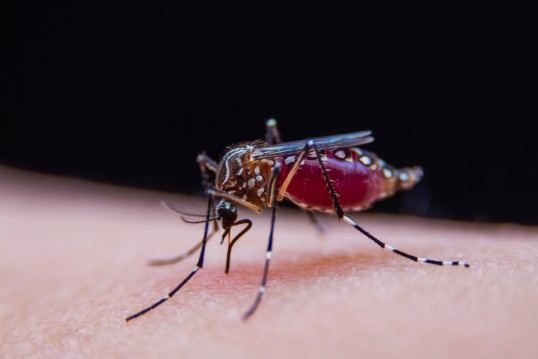- Artificial Intelligence (AI)
- Occupational exposure limit values
- Climate Change and Occupational Safety
- List of CMR substances
- Electromagnetic fields
- Ergonomics
- Industrial Security
- Collaborative robots
- Noise
- Nanoparticles at the workplace
- Optical Radiation
- REACH
- Reference materials
- Proficiency testing
- Vibration
- Virtual reality
- Work 4.0
Infectious diseases, allergens and toxins

Asian tiger mosquito (aedes albopictus) during their blood meal
Source: AUUSanAKUL+ - stock.adobe.com
Background
Global warming enables carriers of infectious agents such as mosquitoes and ticks (vectors) to spread more widely in Germany. This is confirmed by the German Status Report on Climate change and Health produced by the Robert Koch Institute (RKI).
These vectors are becoming increasingly common in Germany and can now be found in regions where they were unknown only a few years ago. The growing distribution of ticks increases the risk of Lyme disease or tick-borne encephalitis (TBE). Outdoor workers are particularly at risk. Over 20 pathogens can be transmitted by the Asian tiger mosquito, including the yellow fever, zika and chikungunya viruses.
Rapid and far-reaching spread of infectious pathogens can lead to the outbreak of epidemics and, in the worst case, pandemics. Owing to the COVID-19 pandemic, awareness of their impacts upon infection protection and occupational safety and health is still strong.

Common ragweed (Ambrosia artemisiifolia) in bloom
Source: Elenathewise - stock.adobe.com
Permanently higher temperatures in Germany lead to shifts in growing seasons. Many plants begin flowering earlier in the year, which extends the pollen season. Furthermore, many plants with allergenic potential thrive at higher temperatures. A rise in temperature can therefore favour the spread of allergenic plants. Owing to the elevated pollen exposure and its longer duration, sensitized employees can be expected to suffer more heavily from the effects of allergen exposure, with adverse consequences for their health and performance. Sustained physical fatigue and increased tiredness caused by the medication can increase the likelihood of occupational accidents.
Warmer temperatures are also contributing to the spread of species of fauna such as the oak processionary caterpillar, whose hairs can trigger allergic or toxic reactions or mechanical irritation. Risks posed by the spread of invasive plant species (neophytes) such as ragweed, which has a much higher allergic potential than native grasses, are also increasing.
Work of the KKA at the IFA:
The IFA has its own section providing expertise on potential hazards presented by biological substances in the workplace. Protective measures against biological agents are also part of the IFA’s research and advisory services, as was shown by the support offered during the COVID-19 pandemic.
Note:
Research into and consulting on aspects relevant to occupational medicine are conducted primarily by the IPA’s Competence Centre Allergology/Immunology.
Contact

Competence Centre for Climate Change and Occupational Safety and Health at the IFA
Email: kka@dguv.de
Contacts:
Biological Agents section at the IFA:
Dr Annette Kolk
Tel: +49 30 13001-3240
For the topic of allergens:
IPA Competence Centre Allergology/Immunology
